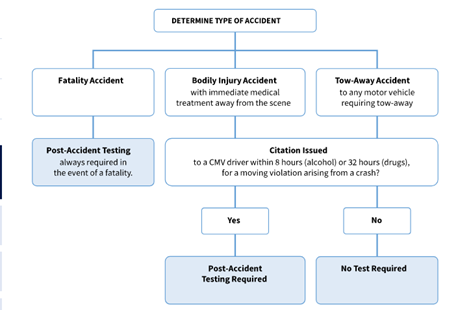Three circumstances require you to do a post-accident drug and alcohol test according to FMCSA regulations.
- A test always is conducted on a surviving driver when an accident involving a commercial motor vehicle results in a fatality. The driver does not need to be cited for a moving traffic violation, nor does the driver need to be deemed at fault. If a fatality occurs, the driver is tested.
- A test must be conducted if the driver receives a citation for a moving traffic violation and one or more of the vehicles involved in the accident is towed from the scene of the accident; OR
- The driver receives a citation for a moving traffic violation, and one or more persons involved in the accident immediately receive medical treatment away from the scene of the accident.
What are the time limits for conducting these tests?
The alcohol test should be conducted within two hours of the accident and the drug test within 32 hours of the accident. If the alcohol test is not performed within two hours, the employer should continue to make an effort to have the driver tested for up to eight hours and prepare and maintain, on file, a record of why the test was not administered. If a drug test is not conducted within 32 hours of the accident, the employer shall cease any attempt to administer a drug test and prepare and maintain, on file, a record stating the reasons why the test was not administered.
Must these tests be conducted under the procedures outlined in the 49 CFR, Part 40?
Yes, with one exception. A urine specimen must be submitted for a drug test and a breath specimen for the alcohol test. The exception is if a law enforcement officer investigating the accident has reasonable suspicion to believe that a driver is under the influence of drugs and/or alcohol, the law enforcement official may require the driver to submit to a breath or blood alcohol test.
FMCSA Post Accident Decision Tree – www.fmcsa.dot.gov

As a CTA Member you can utilize CTA’s Drug and Alcohol testing program TSCTesting.com to help you get in and stay in compliance! Reach out to members of the TSC Testing team today and we can provide the tools and resources needed. Contact us at info@tsctesting.com or by phone: 916-345-5022. https://tsctesting.com/contact-us/. Source: www.fmcsa.dot.gov